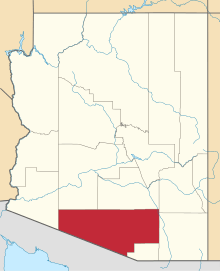San Xavier, Arizona
| San Xavier, Arizona | |
|---|---|
| Populated place | |
|
The remains of a narrow gauge railroad trestle at San Xavier. Helmet Peak is at the left and the Santa Rita Mountains are in the background. | |
 San Xavier, Arizona | |
| Coordinates: 31°58′19.05″N 111°05′40.00″W / 31.9719583°N 111.0944444°WCoordinates: 31°58′19.05″N 111°05′40.00″W / 31.9719583°N 111.0944444°W | |
| Country | United States |
| State | Arizona |
| County | Pima |
| Elevation | 3,540 ft (1,080 m) |
| Time zone | Mountain (MST) |
| Area code(s) | 520 |
| Post Office opened | March 4, 1887 |
| Post Office closed | May 23, 1892 |
San Xavier is a populated place in Pima County, Arizona, seventeen miles southwest of Tucson, and six miles northwest of Sahuarita. Originally a small silver mining camp from the 1880s, today San Xavier is little more than a collection of rural homes and partially abandoned mines. The ghost towns of Azurite and Mineral Hill were located about one mile north of San Xavier. Twin Buttes was five miles southeast.[1][2][3]
History
The San Xavier Mining & Smelting Company was established in 1880 by Colonel C. P. Skyes, who named his company after the San Xavier Mission, ten miles northeast. Soon after, the town of San Xavier was formed in between Helmet Peak and White Hill. Several mines and associated camps were located in the immediate area, including Azurite, Mineral Hill, Wedge, and the Michigan Maid, though there were no smelters, and ore had to be shipped elsewhere. Miners were paid with checks.[1][2][4][5]
In the early 1880s, the Olivette Mine was established just southwest of San Xavier. As a result, the town was renamed Olive, in honor of Mrs. Olive Stephenson Brown, who was the wife of one of the mine's owners, James Kilroy Brown. The Brown family also owned the nearby Sahuarita Ranch, which eventually became the town Sahuarita. Author James E. Sherman, in his book Ghost Towns of Arizona, says that Mrs. Brown treated the local miners to a free chicken dinner every Sunday until the late 1880s, when the Olivette Mine was sold and the Brown family moved to Tucson.[2][6][7]
After the Brown family moved away, silver prices fell and mining in the Pima District switched to copper, leading to the decline of the town. The Olive Post Office was briefly open from March 4, 1887, to May 23, 1892, although operations at the nearby San Xavier Mine continued until 1918. Since then, the area has been known as San Xavier. In 1943, the Eagle-Picher Mining Company purchased the San Xavier Mine and placed it back into production. However, operations were curtailed in 1952 due to low metal prices.[2][5][6]
A few residents remain in San Xavier, and since 1958 the University of Arizona has maintained an underground mining laboratory inside one of the old mine shafts. The large, modern Pima-Mission Mine is located immediately east of San Xavier. The ruins are not open to the general public because of the dangerous mine shafts throughout the area.[1][5]
Gallery
-

Another view of the abandoned railroad trestle.
-

Ruins at San Xavier.
-

The ruins of a stone building in San Xavier.
-

Inside the ruins of the stone building.
-

Another view inside the stone building.
-

A mine shaft warning sign with a sealed shaft in the background.
-

A mine shaft and the remains of a narrow gauge railroad.
-

A mine shaft that looks like a face.
-

Inside a horizontal mine shaft.
-

Inside a vertical mine shaft
-

A miner's message.
-

Helmet Peak
See also
References
- ↑ 1.0 1.1 1.2 "San Xavier, AZ". Retrieved 2013-12-05.
- ↑ 2.0 2.1 2.2 2.3 Sherman, James E.; Barbara H. Sherman (1969). Ghost Towns of Arizona. University of Oklahoma Press. ISBN 0806108436.
- ↑ "Arizona Daily Star - Mine Tales: Pima Mining district grew from humble beginnings". Retrieved 2013-12-05.
- ↑ Sheridan, Thomas E. (2008). Landscapes of Fraud: Mission Tumacacori, the Baca Float, and the Betrayal of the O'odham. University of Arizona Press. ISBN 0816527490.
- ↑ 5.0 5.1 5.2 "San Xavier Underground Mining Lab : Department of Mining and Geological Engineering". Retrieved 2013-12-05.
- ↑ 6.0 6.1 "Olive - Arizona Ghost Town". Retrieved 2013-12-05.
- ↑ Goorian, Philip (2002). Green Valley, Arizona. Arcadia Publishing. ISBN 0738520721.
| |||||||||||||||||||||||||||||||||

